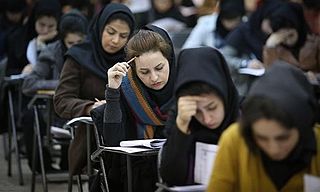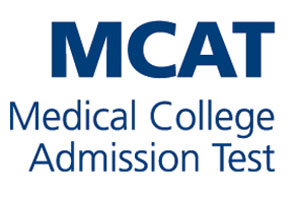Related Research Articles
Abitur, often shortened colloquially to Abi, is a qualification granted at the end of secondary education in Germany. It is conferred on students who pass their final exams at the end of ISCED 3, usually after twelve or thirteen years of schooling. In German, the term Abitur has roots in the archaic word Abiturium, which in turn was derived from the Latin abiturus.

A graduate school is a school that awards advanced academic degrees with the general requirement that students must have earned a previous undergraduate (bachelor's) degree. A distinction is typically made between graduate schools and professional schools, which offer specialized advanced degrees in professional fields such as medicine, nursing, business, engineering, speech–language pathology, or law. The distinction between graduate schools and professional schools is not absolute since various professional schools offer graduate degrees and vice versa.
The Graduate Record Examinations (GRE) is a standardized test that is an admissions requirement for many graduate schools in the United States and Canada and a few other countries. The GRE is owned and administered by Educational Testing Service (ETS). The test was established in 1936 by the Carnegie Foundation for the Advancement of Teaching.

Doctor of Medicine is a medical degree, the meaning of which varies between different jurisdictions. In the United States, and some other countries, the M.D. denotes a professional degree. This generally arose because many in 18th-century medical professions trained in Scotland, which used the M.D. degree nomenclature. In England, however, Bachelor of Medicine, Bachelor of Surgery was used and eventually in the 19th century became the standard in Scotland too. Thus, in the United Kingdom, Ireland and other countries, the M.D. is a research doctorate, honorary doctorate or applied clinical degree restricted to those who already hold a professional degree (Bachelor's/Master's/Doctoral) in medicine; in those countries, the equivalent professional to the North American and some others use of M.D. is still typically titled Bachelor of Medicine, Bachelor of Surgery (M.B.B.S.).
A medical school is a tertiary educational institution, or part of such an institution, that teaches medicine, and awards a professional degree for physicians. Such medical degrees include the Bachelor of Medicine, Bachelor of Surgery, Master of Medicine, Doctor of Medicine (M.D.), or Doctor of Osteopathic Medicine (D.O.). Many medical schools offer additional degrees, such as a Doctor of Philosophy (Ph.D.), master's degree (M.Sc.) or other post-secondary education.
A cram school, informally called crammer and colloquially also referred to as test-prep or exam factory, is a specialized school that trains its students to achieve particular goals, most commonly to pass the entrance examinations of high schools, or universities. The English name is derived from the slang term "cramming", meaning to study hard or to study a large amount of material in a short period of time.
The Association of American Medical Colleges (AAMC) is a nonprofit organization based in Washington, D.C. that was established in 1876. It represents medical schools, teaching hospitals, and academic and scientific societies, while providing services to its member institutions that include data from medical, education, and health studies, as well as consulting. The AAMC administers the Medical College Admission Test and operates the American Medical College Application Service and the Electronic Residency Application Service. Along with the American Medical Association, the AAMC co-sponsors the Liaison Committee on Medical Education, the accrediting body for all U.S. MD-granting medical education programs.
University admission or college admission is the process through which students enter tertiary education at universities and colleges. Systems vary widely from country to country, and sometimes from institution to institution.
In New York State, Regents Examinations are statewide standardized examinations in core high school subjects. Students are required to pass these exams to earn a Regents Diploma. To graduate, students are required to have earned appropriate credits in a number of specific subjects by passing year-long or half-year courses, after which they must pass at least five Regents examinations in some of the subject areas. For higher-achieving students, a Regents with Advanced designation and an Honors designation are also offered. Students with disabilities or enrolled in an English as a Second Language program are able to earn a local diploma.
The Graduate Medical School Admissions Test is a test used to select candidates applying to study medicine, dentistry, optometry, pharmacy and veterinary science at Australian, British, and Irish universities for admission to their Graduate Entry Programmes. Candidates may take the test in a test centre in one of the 6 countries, being Australia, Ireland, New Zealand, Singapore, the United Kingdom and the United States, offering the test.

The National College Entrance Examination (NCEE), commonly known as the gaokao, is a standardized college entrance exam held annually in mainland China. It is required for entrance into almost all higher education institutions at the undergraduate level. It is usually taken by students in their third and last year of senior high school, but the age requirement was abolished in 2001.
The University of the Philippines College Admission Test, commonly known as UPCAT, is part of the admission requirements of the University of the Philippines, administered to graduates of Philippine and foreign high schools.
The Polytechnic University of the Philippines College Entrance Test, commonly known as PUPCET, is part of the admission requirements in the Polytechnic University of the Philippines, administered to graduates of Philippine and foreign high schools. It is used to measure the capability of incoming students depending on what degree will the applicant choose. Of an estimated 50,000 annual entrance test examinees, only 8,000 will be accepted due to the university's limited budget.

The University of the Philippines Manila College of Medicine (CM) is the medical school of the University of the Philippines Manila, the oldest constituent university of the University of the Philippines System. Its establishment in 1905 antedates the foundation of the UP System and makes it one of the oldest medical schools in the country. The Philippine General Hospital, the national university hospital, serves as its teaching hospital.
Medical education in Philippines is principally offered and developed by accredited and government recognized medical schools in the country.

The Iranian University Entrance Exam, simply known as Konkour, is a standardized test used as one of the means to gain admission to higher education in Iran. Generally, to get a Ph.D. in non-medical majors, there are three exams, all of them called Konkour.
The Silliman University Medical School (SUMS) is an academic unit of Silliman University (SU), a private university, in Dumaguete City, Philippines. Established on March 20, 2004, the school used to hold classes at a two-storey annex beside the Angelo King Allied Medical Sciences Center inside the SU Campus. In 2013, the school transferred to its new building. As one of the newest medical schools in the Philippines, its pioneering batch graduated in 2009. The first batch of graduates who took the physician board exams in 2010 all passed giving the school its first 100% passing rate. The second graduating class that took the said exams in 2011 also passed giving the school another 100% passing rate. On its third batch of graduates who took the Physician Licensure Examinations in the year 2012, the medical school yet again attained a 100% passing rate, making it the third time in three consecutive years for the school to attain a perfect passing percentage. Its partner institution is the Silliman University Medical Center.

The Medical College Admission Test is a computer-based standardized examination for prospective medical students in the United States, Australia, Canada, and Caribbean Islands. It is designed to assess problem solving, critical thinking, written analysis and knowledge of scientific concepts and principles. Before 2007, the exam was a paper-and-pencil test; since 2007, all administrations of the exam have been computer-based.
SAT Subject Tests were 20 multiple-choice standardized tests given by the College Board on individual subjects, typically taken to improve a student's credentials for college admissions in the United States. On January 19, 2021, the College Board discontinued Subject Tests. This was effective immediately in the United States, and the tests were to be phased out by the following summer for international students.
References
- ↑ "Requirements & Procedures for Admission to Philippine Medical Schools – NMAT Online Registration System". Cem-inc.org.ph. Retrieved 2014-12-17.